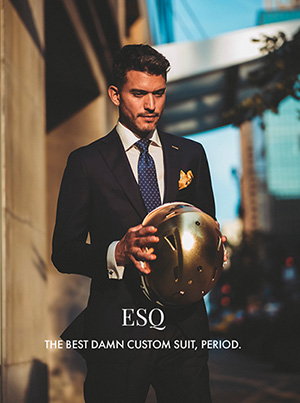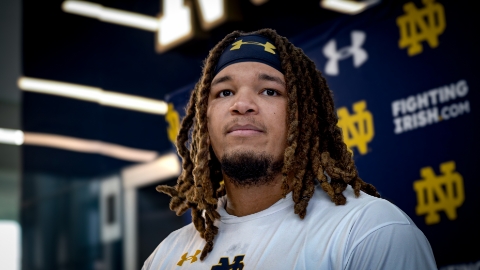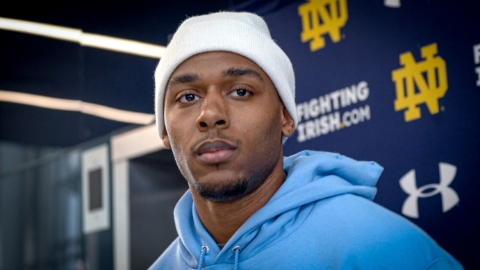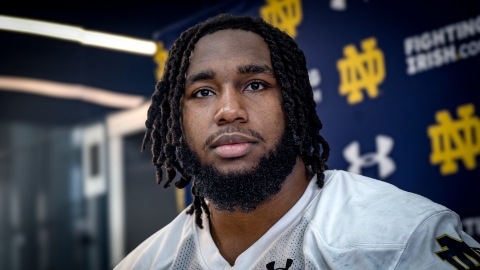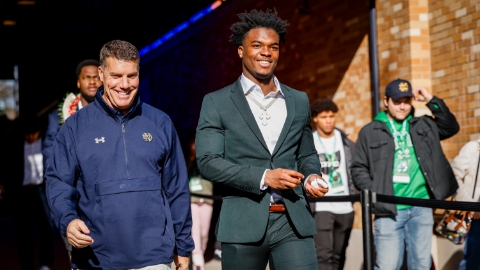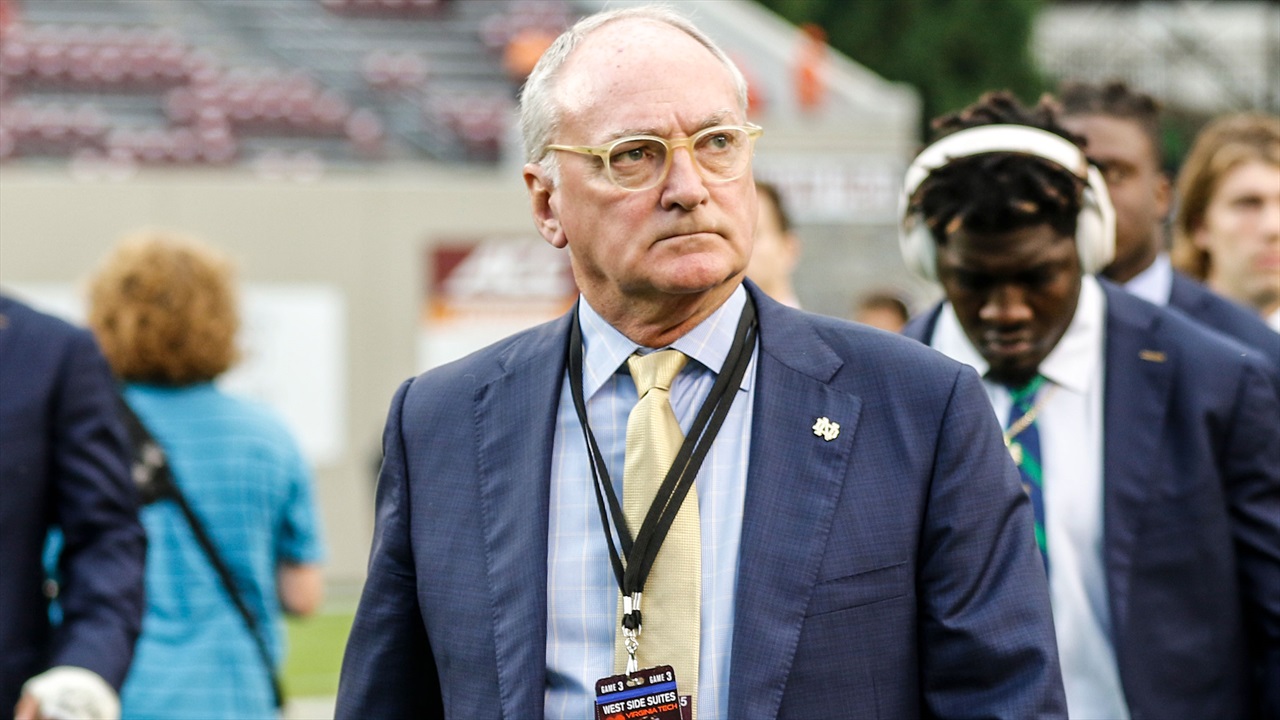
There would be no shortage of material should Jack Swarbrick elect to pen an autobiography about his nearly three-decade career as a lawyer in addition to his work in the world of athletics – the last 13 years of which he has spent presiding over collegiate sports' most global institution.
Yet Notre Dame's veteran athletics director jokes he could author a tome merely on the last year-and-a-half in the face of an unprecedented pandemic, as well as finding himself with seminal roles in the saving of college football's 2020 season and the potential expansion to a 12-team College Football Playoffs.
Amidst all that, Swarbrick carved time for a one-on-one sit-down with Irish Sports Daily.
Part I of this two-part question-and-answer, de facto “State of the Notre Dame Athletics Union” address follows. Part II concludes the mini-series on Monday.
It includes Swarbrick's reflections on the past year, how confronting COVID as the face of Notre Dame athletics helped him find reassurance and energized him; his future atop the program; sweeping new Name, Image and Likeness changes, as well as the 12-team College Football Playoffs proposal; Mike Brey's program-reset, Link Jarrett's remarkable success – and an update on potential contract negotiations; as well as where the Irish might face BYU in 2022 and Brian Kelly's perch on the cusp of Notre Dame's all-time wins record. Swarbrick also addresses how all those noteworthy moments of the past year-plus might impact his next pursuit of a head coach, football or otherwise; the Irish's relentlessness to secure Marcus Freeman's services as defensive coordinator and expanding resources in football recruiting, as well.
Too, Swarbrick shares his frustrations of still awaiting a viable explanation as to why Jarrett's Fighting Irish didn't get to host an NCAA Baseball Super Regional last month – especially, Swarbrick notes, since Notre Dame went down swinging on the road to eventual national champion Mississippi State.
IRISH SPORTS DAILY: It's been approximately one year since the college football season specifically and essentially all college athletics' 2020 seasons were hanging in the balance. As you reflect back now one year later, what did you learn from that process? What were those tensest moments like? When did you first get an opportunity to come up for air?
JACK SWARBRICK: I'm not sure that's happened, yet. What I remember or the strongest impressions from the time are how elusive good information was. Making critical decisions for student-athletes, engaged in decisions being made nationally, and every day the information changed.
I use the example of the (ACC) conference basketball tournament. The first day, 'Oh, we're going.' The second day, 'Well, we'll go but no spectators.' The third day, 'Well, we're cancelled.' Everything was moving like that.
So you tried to get the best information that you could, talk to as many people as you could. But I got really comfortable with the fact that I was going to be wrong, this was just going to be part of this dynamic. You couldn't get too caught up in that.
ISD: In your professional career, do you recall anything requiring more patience than merely wading through that process trying to find a way to salvage the college football and other sports' seasons?
JS: It was a weird combination of patience and urgency. You know? You had decisions you had to make. We had a really rough six hours where we were pulling our teams off the road, and teams that were going very well at the time. It was hard. But you had to make that decision then and stick to it.
Huge communications challenges, because the information did change every day. We would meet with coaches, student-athletes, give them the best sense of what was going on. And then I'd go back and say, 'You know what I told you yesterday? Maybe not.'
It will sound very much like the company policy, but the experience reinforced for me that there's no place in the world that I would have rather gone through it than here. Extraordinary people who are committed to all the right things. Made unbelievable personal sacrifices to make things work.
And, it was the thing that kept you going every day. Seeing those examples. Seeing people say, 'I'll go clean the golf carts.' That's not their job; they might do something completely different. But somebody has to go do that, somebody would do that. It was constant examples of that. It was that paired with the leadership role this place is able to take. I'm proud of the role we played with the decisions that were made with college athletics during that time. But I was able to make them because Father John (Jenkins) made the announcement in May that we were coming back before anybody else was prepared to say that. That was a great example of leadership that gave me my marching orders. OK, if we're coming back to school, we're coming back to play. It was so rewarding to hear.
ISD: That leads me into a two-pronged question: Notre Dame has announced a plan to return to full capacity inside Notre Dame Stadium in the fall. After such a different experience in the venue last year, how eager are you for that environment to return?
How much has perhaps this entire process, confronting COVID-19 head-on, the potential for College Football Playoffs expansion, the ongoing Name, Image, Likeness changes, energized or re-energized you? How much longer do you want to sit in the top chair for arguably the single-most demanding job in college athletics?
JS: Those are both good questions. I'm very enthused about being able to provide our student-athletes with a more normal experience. We went through sort of stages throughout the year. They were asked to play initially in venues where their parents couldn't even attend. Then it gets to a point where your parents can but there's nobody else there. So for them, to put them back in a normal environment, is … it makes me feel … it's the pay-off for what we did. It's (saying), 'OK, now we can do this.'
Having said that, I'm still pretty nervous. Vaccination rates in St. Joe County aren't where you would like them to be. The Delta variant seems to spread very easily. So enthused, but thinking we're still going to be dealing with a pandemic this year and we have to be smart about that.
With regard to how long I am (Notre Dame's athletics director), I don't know. This job takes remarkable energy. As long as I still have it, I love the job. But I think I'm pretty self-aware in that regard. And if I don't think, if I think I've lost that, it's important to have somebody here who has it. But this was, the only thing comparable in my lifetime in terms of physical, mental and emotional demands to this year was the Pan-American Games when we ran those in Indianapolis (in 1987). And this was a combination of everything going on. The pandemic, you had Alston litigation (the sweeping NCAA vs. Alston et. al Supreme Court of the United States case), you had Name, Image and Likeness, you had what for me was the biggest time commitment in some ways, which was the CFP playoff-redesign. So, added together, it was a year unlike any other.
ISD: You bring up two of my main topics. NIL and the CFP. Starting first with NIL, what are your thoughts here as it unfolds across almost its first month? Where do you see it going, near-term and long-term?
JS: I wish we were unfolding it with a little more well-defined parameters for college athletics, but we don't have that. I've been very pleased with our roll-out here and our ability to increasingly give clear direction to our student-athletes.
It's going to be a very ugly and very clunky year, nationally. There will be schools that will do things that other schools will choose not to do. I think a year of that will get us to a position where one way or another, we will have some guardrails, some parameters for it that are lacking right now, that we really need.
All in all, very pleased with the rollout here. I never thought it was the revolutionary change people assumed it to be. There will be individuals who benefit greatly here, but by and large, the market is not that robust and the opportunities are going to be limited.
ISD: I've tried to stay very cognizant of NIL developments both in regards to Notre Dame and nationally. Some schools have policies that are fairly wide-open, others mandate student-athletes may not wear any team-issued gear and still others, the University of Arkansas for example, has indicated it does not even want its student-athletes wearing school colors in potential NIL endorsement opportunities. Where does Notre Dame fall within that situation?
JS: Yes. And I think it's almost every school, but you have to protect your intellectual property. So, school trademarks, the registered colors, the names, none of those can be applied for commercial purposes by a third party. In this case, student-athletes. It's not new; it's just that student-athletes now are running into it for the first time. So, yeah, that's a big element of this.
ISD: So, to follow up, you believe that there will be some uniformity that comes from this initial roll-out of NIL that's sort of been a free-for-all for all concerned parties? That will come with time?
JS: I do. I would not be surprised if what prompts it is the coming recruiting cycle. That's where you're going to see a lot of representations made, commitments made related to Name, Image and Likeness that beg for guardrails. The schools shouldn't be agents or brokers of deals. That's not how they should work. We are all for students being able to benefit from their Name, Image and Likeness, but it should happen through their initiative.
ISD: The Transfer Portal, Name, Image & Likeness legislation, now more than a year of the COVID-19 pandemic. How do these factors maybe shape the way that you approach your next head coaching hire, whether that's in football or any other sport? What about the developments and events of the last year, year-and-a-half maybe influence the way you approach your next coaching hire, if at all?
JS: It reinforces the thing that was already most important to us, which is fit. We touched briefly on our approach to protecting the University marks. You've got to come in and see the benefits of that. You can't come in and say, 'Hey, we need to change this. I can only be successful as a coach if we change this.' Right? That's not going to change. We're not going to change our housing policy. So, our model, while we have certainly benefited from the increased ability of student-athletes to transfer; our baseball team had some important transfers, our hockey team I think has four coming in, it will never be the well-spring of how this place operates. And again, a coach has to understand that. You can't come in with a plan to develop a program around transfers. That's just not who we are.
So, longwinded way of saying it just reinforces the importance of finding people who see the uniqueness of this place as an attribute not an obstacle.
